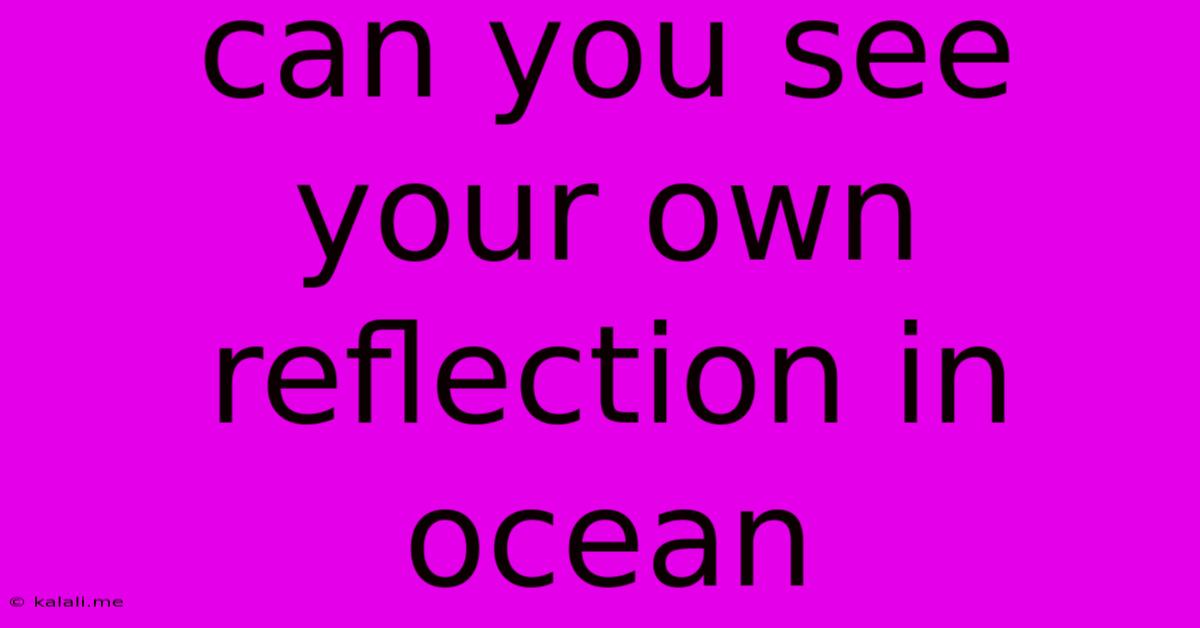Can You See Your Own Reflection In Ocean
Kalali
Jun 01, 2025 · 3 min read

Table of Contents
Can You See Your Reflection in the Ocean? The Science Behind the Mirror-Like Surface
Have you ever wondered why sometimes the ocean looks like a perfect mirror, reflecting the sky and clouds flawlessly, while other times it's a chaotic jumble of waves and whitecaps? The ability to see your reflection in the ocean depends on several factors, primarily the surface smoothness of the water. This article delves into the science behind those mirror-like moments and explains why a perfect reflection isn't always the case.
The Physics of Reflection: Smooth Surfaces vs. Rough Seas
The key to seeing your reflection lies in the principles of specular reflection. This type of reflection occurs when light waves strike a smooth surface and bounce back at a predictable angle. Think of a mirror – the perfectly smooth surface ensures a clear, undistorted reflection. The ocean, however, is rarely perfectly smooth.
When the ocean surface is calm, with minimal wind and waves, the light waves behave similarly to how they do on a mirror. They strike the relatively flat surface and reflect back, creating a clear image. This is why you're most likely to see your reflection in the ocean on a calm, windless day.
Conversely, when the ocean is rough – due to wind, currents, or waves – the surface becomes uneven. Light waves now hit the water at various angles, scattering in different directions. This is called diffuse reflection, and instead of a clear reflection, you see a blurry, distorted image or no reflection at all. The smaller the waves, the clearer the reflection; the larger the waves, the less likely you are to see your own image.
Other Factors Affecting Ocean Reflections
Besides wave action, several other factors influence the clarity of an ocean reflection:
-
Sunlight: Bright, direct sunlight enhances the visibility of reflections. Overcast skies, on the other hand, can diffuse the light and reduce the clarity of the reflection. The angle of the sun relative to the water also plays a role.
-
Water Clarity: The clarity of the water itself influences the reflection. Clear, clean water reflects light more efficiently than murky water containing sediment or algae. The presence of these particles can scatter light, reducing reflection quality.
-
Depth: While not as significant as surface smoothness, the depth of the water can subtly affect the reflection. Shallower water might show more distortion due to interaction with the seabed.
-
Oil Slicks: Believe it or not, oil slicks on the water surface can actually create exceptionally calm and reflective areas. This is because the oil reduces surface tension, damping the effect of small waves. However, this is obviously not a natural or desirable phenomenon.
Beyond Simple Reflections: The Beauty of Ocean Light
While seeing your reflection is a fascinating aspect of the ocean's behavior, it's just a small part of the bigger picture. The ocean's surface is constantly interacting with light, creating a stunning array of colors, patterns, and textures. From shimmering highlights to the deep blues and greens, the interplay of light and water is a captivating spectacle in its own right. Understanding the science behind reflection allows us to appreciate the complex beauty of the ocean even more.
In conclusion, whether or not you can see your reflection in the ocean depends largely on the smoothness of the water's surface. Calm conditions, clear water, and bright sunlight all contribute to a clear reflection. However, the ocean's dynamic nature ensures that those perfect mirror-like moments are not always guaranteed, adding to its ever-changing and captivating character.
Latest Posts
Latest Posts
-
Mtg Whenever This Creature Gets A 1 1 Counter
Jun 02, 2025
-
How To Connect Wire Fallout 4
Jun 02, 2025
-
Red Hunting Hat Catcher In The Rye
Jun 02, 2025
-
Can You Use Treated Lumber Indoors
Jun 02, 2025
-
What Film Is This Picture From
Jun 02, 2025
Related Post
Thank you for visiting our website which covers about Can You See Your Own Reflection In Ocean . We hope the information provided has been useful to you. Feel free to contact us if you have any questions or need further assistance. See you next time and don't miss to bookmark.